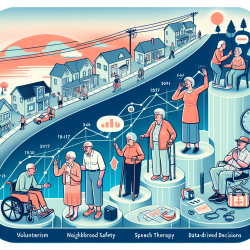Introduction
In the evolving landscape of healthcare, the role of caregivers is becoming increasingly pivotal. As healthcare professionals, it is crucial to recognize the challenges caregivers face, especially post-hospitalization. The study titled "Quality improvement study on early recognition and intervention of caregiver burden in a tertiary hospital" provides insightful data on how early recognition and targeted interventions can significantly alleviate caregiver burden. This blog will explore the findings of this study and offer practical applications for practitioners.
Understanding Caregiver Burden
Caregiver burden is a multifaceted issue that encompasses physical, emotional, financial, and social strains. The study utilized the Zarit Burden Interview (ZBI) to assess caregiver burden at two points: during hospital admission (T0) and 30 days post-discharge (T1). The results were compelling, showing a significant reduction in burden scores post-intervention (T0 mean=11.08, SD=7.64; T1 mean=2.48, SD=3.36, p<0.001).
Key Interventions
The study identified several targeted interventions that contributed to the reduction in caregiver burden:
- Use of ZBI: Implementing the ZBI as part of the initial assessment allowed for a structured evaluation of caregiver burden.
- Personalized Caregiver Training: Providing individualized training on caregiving skills and chronic disease management helped caregivers feel more competent and less stressed.
- Community Support Referrals: Referrals to community services such as day care centers and respite care provided much-needed relief for caregivers.
- Post-Discharge Follow-Up: Regular follow-ups via phone calls and home visits ensured continuity of care and support for caregivers.
Implications for Practitioners
For practitioners, integrating these interventions into routine care can lead to improved outcomes for both caregivers and patients. By recognizing caregiver burden early, practitioners can tailor interventions that address specific needs, thereby enhancing the caregiver's ability to provide effective care.
Practitioners are encouraged to incorporate the ZBI into their assessment protocols and to engage in continuous training to better support caregivers. Collaboration with community resources can also play a significant role in alleviating caregiver stress.
Encouraging Further Research
While the study provides a strong foundation, further research is needed to explore additional variables such as family dynamics and the long-term impact of interventions on patient outcomes. Practitioners are encouraged to contribute to this growing body of research by conducting studies within their own settings.
To read the original research paper, please follow this link: Quality improvement study on early recognition and intervention of caregiver burden in a tertiary hospital.










